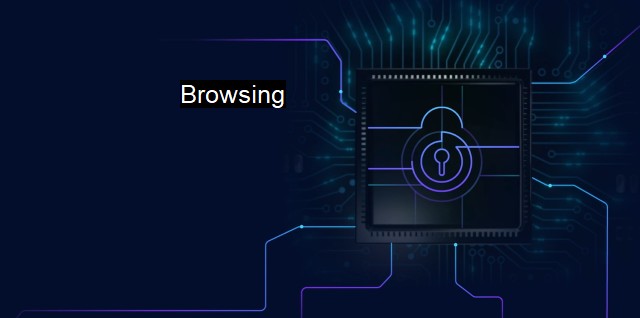What is Browsing?
Safeguarding Your Online Presence: The Role of Antivirus Software in Protecting Against Cyber Threats While Browsing the Internet
Browsing refers to the process of navigating through websites on the internet. By entering a URL or clicking a link, individuals access various websites to find educational content, entertainment material, to shop and for other online activities. browsing also gives rise to numerous opportunities for cyber threats such as viruses, malware, and phishing scams to infiltrate computer systems, thereby highlighting the crucial role that cybersecurity plays in our daily online activities.A groundbreaking feature of modern technology, browsing revolutionizes the way individuals search for, gather and share information. Web browsers, including Google Chrome, Firefox, and Safari, establish the connection between one's device and the server hosting the chosen website. As the central interface between computer systems and the internet, browsing enables us to interact and communicate within the vast digital world - in real-time.
The interconnected structure of the internet, that allows devices to communicate seamlessly, is a double-edged sword as this architecture inadvertently opens channels for cyber attackers. Malicious web content could potentially force a system to download malicious software scripts that are designed to wreak havoc on computer systems or steal valuable digital assets and sensitive information.
Expansion of e-commerce, online banking, and various online services heightens the need for data protection making the subject of cybersecurity in browsing a top priority. Cyber threats have continually become intricate, often exploiting weak points in the system that individuals might know little about. Cybersecurity, therefore, focuses on implementing defense mechanisms to protect the integrity of computer systems, improving privacy, and confidential data from impending attacks.
While browsing, tools like antivirus programs keep systems from potential threats. Antivirus software is a computer program designed to prevent, uncover, and neutralize malicious software known as viruses. Modern antivirus programs are umbrella security solutions that extend protection to more advanced forms of malware, including ransomware, Trojan horses, spyware, and adware in addition to viruses.
Antivirus scans a system for established threat identifiers - unique signatures that distinguish malware from legitimate software. If found, the antivirus either blocks or eradicates the threat from the system. Heuristic virus detection is another technique used by antivirus software to identify new or modified viruses using an algorithm to analyze the attributes of such files.
Contemporary antivirus software often includes a firewall that blocks malware from accessing the internet, phishing protection to guard the system from fraudulent websites, and secure browsers that ensure safe browsing by segregating the browsing environment. Extended features often include safeguarding the users from malicious web content, blocking access to risky websites, and preventing drive-by downloads. Special anti-malware software goes beyond recognizing known malware signatures and employs behavior-based detection technology to monitor active programs and detect malicious activities as they occur.
While antivirus tools are indispensable, browsing practices and habits also contribute to safer internet usage. For instance, browsing websites that are HTTP secure (HTTPS), refraining from opening emails or links from unknown sources, keeping software and applications up-to-date and regularly changing and strengthening passwords greatly improve the browsing security.
Regularly backing up data can also minimize damages if a threat bypasses security measures and infects the system. This ensures that the valuable data can be recovered and the machine can be wiped clean, starting anew with a lesser risk of contamination.
Browsing, therefore, is an essential part of interacting with the cyberspace, holding both conveniences and possible threats. Consequently, cybersecurity measures like antivirus software go hand in hand with cautious browsing habits to secure user's privacy and the well-being of computer systems.

Browsing FAQs
What is browsing?
Browsing refers to using a web browser to access and view content on the internet. It involves entering a website address, navigating through pages, and interacting with online content.How can I protect myself while browsing?
To protect yourself while browsing, use antivirus software that includes web protection features. Avoid downloading files and clicking on links from unfamiliar or suspicious sources. Also, use secure connections (https) when entering sensitive information such as login credentials or credit card details.What is a browser extension?
A browser extension is a small software program that enhances the functionality of a web browser. Some extensions may help with cybersecurity by blocking ads, tracking cookies, or malicious content. However, it's important to be cautious when installing extensions and only download from reputable sources to avoid installing malware or spyware.Why is browsing securely important?
Browsing securely is crucial to protect personal information, prevent identity theft, and avoid malware infections. Cybercriminals often try to compromise users' computers and steal sensitive data by tricking them into clicking on malicious links or downloading infected files. Secure browsing measures such as using antivirus software, keeping software up-to-date, and avoiding risky online behavior can help reduce the risk of cyberattacks.| | A | | | B | | | C | | | D | | | E | | | F | | | G | | | H | | | I | | | J | | | K | | | L | | | M | |
| | N | | | O | | | P | | | Q | | | R | | | S | | | T | | | U | | | V | | | W | | | X | | | Y | | | Z | |
| | 1 | | | 2 | | | 3 | | | 4 | | | 7 | | | 8 | | |||||||